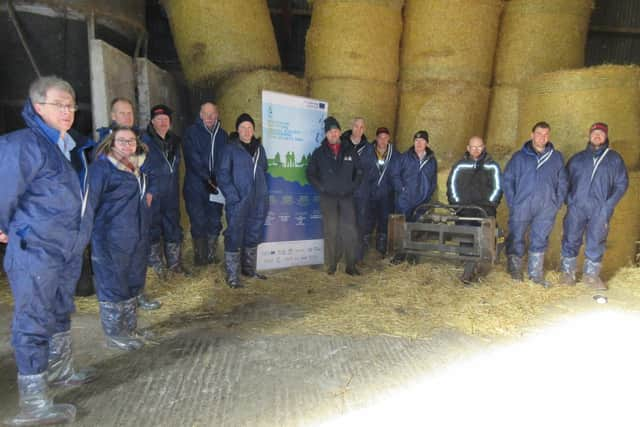Dairy-4-Future farmers discuss Carbon and Mastitis
and live on Freeview channel 276
Mark Blelock manages a dairy herd of 150 cows near Crumlin with an average annual milk yield over 10,000 litres per cow and milk solids output of 788 kg per cow.
As part of the Dairy-4-Future project Mark, along with the other pilot farmers across the participating countries, submitted data to allow the carbon footprint for his farm to be determined. CAFRE Technologists Robert Patterson and Michaela Tener reviewed these results with the group and identified the sources of emissions on their farms which included enteric fermentation, nutrient management and concentrates. The group also discussed the impact of adopting various mitigation options which included optimising feed efficiency and soil health on their farms as well as including characteristics designed to improve environmental sustainability within their sire selection programmes.
Advertisement
Advertisement
The farmers also received a presentation from Brian McAuley, Firmount Veterinary Clinic and Stephen Gilkinson, CAFRE Dairy Technologist, on the opportunities offered by using the “MastDecide” on farm culturing technique for identifying gram positive and gram negative strains of mastitis causing organisms. Brian and Stephen were both able to show that the effective use of this technique could potentially reduce the use of antibiotics for treating mastitis by up to 50 % depending on the causative organisms. Brian also discussed other management aspects which should be considered when formulating an effective mastitis control plan. This included taking samples to identify causative organisms, recording all cases of mastitis and analysing their causes and making effective use of milk records. The group agreed to meet again later in the year.


Dairy-4-Future is a €3.8 million Atlantic Interreg funded project, which aims to improve the sustainability of dairy farming in the Atlantic region of Europe. Through a consortium of eleven partners, from Scotland to the Azores, the Dairy-4-Future project aims to increase the competitiveness, sustainability and resilience of dairy farms in these Atlantic regions, through the development of innovative and efficient dairy systems. CAFRE would like to express appreciation to all the Dairy-4-Future pilot farmers for their continued co-operation and support with the project.
Further details on the project are given in the Dairy-4-Future website (https://dairy4future.eu/)